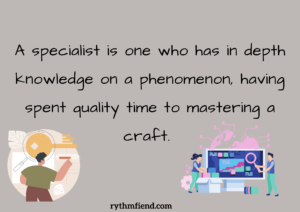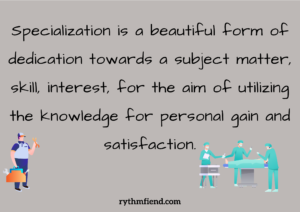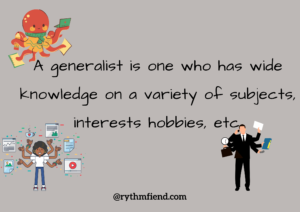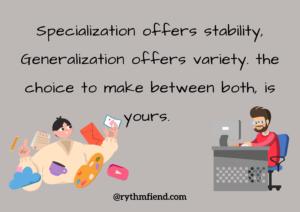Is it better to specialize or Generalize? How do these concepts affect your journey of personal development and growth?
Who Is A Specialist?

Cambridge Dictionary defines specialization as “a particular area of knowledge or the process of becoming an expert in a particular area”.
This means a specialist is one who concentrates on developing a particular skill, an expert.
Think of a neurosurgeon. Basically, he is an expert in brain surgeries. It’s what he has spent his time and resources on, developing and finessing his skill as a brain surgeon.
His knowledge of brain surgery goes deep, A-z of brain surgery, approaches to solving problems, medications, procedures, etc.
A specialist is one with great knowledge of a phenomenon.
Think of an icon in any sector, field, or profession. For instance, an actor who is really good at acting, a renowned painter, a business mogul, a producer, etc.
Those at the top of these sectors likely did so by spending their time and resources on refining their skill daily. With dedication and often a huge amount of passion for their respective fields of expertise.
If we have a problem, we would most likely call on a specialist to fix it. If my electric car becomes faulty, my dad could attempt to show off his skill as a man who can do it all. But an electrical or mechanical engineer would be the perfect specialist to call on.

In this vein, we visit a gynecologist when we have gynecology-related problems. This is because they have spent time studying things related to gynecology, it’s their field of expertise.
We won’t visit a dentist to solve our problems with our skin, they specialize in tooth health, not skin health.
In starting a business, we know it needs different functions working together to run daily. We would smartly employ specialists to perform these functions such as accounting, bookkeeping, logistics, business management, etc.
A specialist provides absolute quality service on a particular phenomenon. Learned over a long period of time
Who is A Generalist?
“A Jack of all trades is a master of none…”
literary figure of speech

We must be familiar with this saying. Interpreted as a person who does many different things may not necessarily be competent at any of them.
A generalist is a person who is knowledgeable about a good amount of things. Unlike like the specialist, a generalist has a wide collection of knowledge on many things. However, it isn’t very in-depth about any or some of them.
They put their energy and time into learning several things. They can be many things at once. E.g, a Baker, shoemaker, songwriter, dancer, chef, content creator, dabbles in accounting, can make bags, book covers, gardens a bit, crotchet a bit, dabbles in candle making, skin care knowledge, etc.
I might consider myself a bit of a generalist. As a hobby, I love many forms and expressions of art and try to accumulate as much knowledge on each art.
It’s safe to say most generalists are artists as well. Arts is fluid, transforming from one means to another. Hence, some people might have a hard time focusing on a limited number of things. They could be everything instead.
I’ve always loved handicrafts from when I was little. I learned to sew, learned baking, and other forms of cooking. Learned to make shoes, learned to make bags, and DIY skin care products, do home care products, paint, write, etc.
The greatest trait of generalization is that this knowledge is just bare and surface-level knowledge. It’s been learned through multiple crash courses, over time.
I believe generalization is a beautiful thing. It shows how fluid humans can be. We can express our creativity in many forms. We can be eclectic, we can learn anything we want, and don’t even need to be professional at everything. It’s like having lots of hobbies and choosing to cultivate them all.
You can be a bird keeper who makes cakes occasionally and makes clothes. Might also have a small business where you sell homemade body butter. At the same time, you’re a master Chef, you can do it all. Multiple interests that you derive pleasure from, the thrill of many choices, and many possibilities.

It’s even worse if you’re like me who gets hyped up over trying new things very frequently. My attention span to my numerous interests and hobbies is very limited.
I’d love to go deeply into my love of vintage arts and the culture of indigenous people. I sit and imagine the huge possibilities I could attain but then I get distracted when I see fashion. Also, I’m so interested in clothes making, clothes history, shows, designers, Inspirations, etc. While I want to focus on that too, I get distracted by a mind-blowing idea to sell food items to lower and middle-class members of society. The possibilities are absolutely endless.
I guess this is why I enjoy social media, especially Pinterest because I can entertain a ton of hobbies while organizing them into boards.
Is it better To specialize or generalize? How Does it matter to me as an individual?
There comes a time in everyone’s life when they have to start earning a living. Because nothing in life is free and you have to pay for everything. Therefore, you have to develop a skill that adds value to your being.
This is why it matters if you should generalize or specialize.

One of the best pieces of career advice you get is to “follow your passion”. It’s easier to enjoy working if it’s something you love. In today’s world, you can make a career of whatever it is you love.
Some people have a hard time settling on what they love because they have various options. Whereas others find it harder because they may have no passions.
In this case, where you have no idea what you love and how to make a living from it. It’s best to get to spend time with yourself, and know your strengths and weaknesses, and the opportunities and threats presented with each strength and weakness. Then you can start from there to get a head start on generalization or specialization.
While generalization is a beautiful thing, specialization gives you something special: credibility, expertise, confidence, and insurance.
Why you should specialize or generalize?
In life, it’s very important to never outdo ourselves. The burnout from doing more than you should be is very heavy. It can be damaging, physically, emotionally, and mentally. The desire to do so much can sometimes work against you eventually.
Let’s use an example to explain this;
Lin is a young woman with various artisan interests. She spent 6 months learning shoemaking. 6 months learning clothes making, 3 months learning makeup. After another 3 months of learning to make “organic skincare”. she can also make some other forms of art. She dreams of making a business out of all her passions, which can mean she’s also passionate about being a businesswoman.
Lin, as we can see, is a Generalist, she has so many passions, interests, and ambitions, she can do so many things and she understands how profitable these ventures are.
She has a surface level on these passions, she makes her own shoes, outfit, makeup, and sometimes hair. In her friendship circle, she is known as the girl who can do it all, and it’s something to be proud of.
How should I know when to specialize or generalize?
On the way forward in life, she can’t possibly entertain each and every single one of her passions with the same ferocity and still maintain a healthy lifestyle.
Overworking is a real thing and it has dangerous effects on your mind, soul, and body.
At the same time, she finds it hard to choose what area she should specialize in to meet her needs. She will have to make a choice, one that benefits her as an individual with a life.
I could suggest the following options for Lin;
- She could focus solely on shoe making as an area of specialization
- She could focus solely on making clothing
- She could focus solely on being a makeup artist
- She could focus solely on hairdressing
- She could focus on becoming creating a business of her passions
Basically, she could focus solely on one of her many passions.
This decision should of course be influenced by how much she is good at what she does. she knows her strengths better than anyone.
If it turns out to be more than one, you have to choose one. But don’t discard the rest, rather, set them /it aside as a contingency.
Let’s assume Lin decides to focus on shoe-making as an area of specialization. She has to further her knowledge or skill set in the art of shoemaking.
She will need to further her education in shoe making and she can achieve this by getting formal, informal, or semi-formal education.
As you know, the more she keeps on sharpening her skill in shoe making, the more she gets knowledge on shoemaking. The better shoemaker she becomes.
She understands shoes. Ins, outs, and in-betweens, style, curves, parts, components, materials, etc. This discipline is very key to the expansion of her craft.
She is in the fashion world where shoes are a very important detail in fashion. One can’t wear a professionally made dress without wearing a professionally made shoe.
This decision to specialize opens her up to limitless possibilities within the fashion genre. She can work with clothes designers to bring styles to life. Also can work with make-up artists to bring styles to life. The possibilities are endless. Including launching her own line of shoes, while collaborating with her other interests. A kind of forward linkage of your similar interests.
Specialization is what creates results and consistency is the driving force of growth.
This could happen in any genre she might have settled for. Being a specialist at something doesn’t have to be a narrow road, you can be flexible with your expertise because learning never ends.

This decision however reflects a sacrifice.
You have to forgo the time and resources allocated to your other passions. To achieve something valuable for yourself as an individual.
Like in the case of Lin, she has to forgo the time she spent on her other various passions and focus on one passion which is also a key strength: shoemaking.
To become a professional shoemaker and/or designer who gets to work with many influential fashion brands, businesses, clientele, etc.
If Lin had decided to create a business of her passions; my advice to her would be this. Take an extensive course on business administration/management, marketing, or even economics.
A bachelor’s degree in either course combined with a master’s degree in a different course in that same business, economics, or management vein.
This mix of says a B.Sc. Marketing and M.Sc. Business administration is a very beautiful tool to enable Lin’s business dreams.
She might not be the Head designer but she can apply her skills to get the best professionals to work with or for her brand and elevate her progress as a businesswoman, Forbes-self-made-rich-entrepreneur-Jeff-Bezos.
With her skill in business, she can operate all her passions by beginning with one at a time. Carefully creating and building her business, and slowly curating each craft one at a time.
“ a Jack of all trades is a master of none but is better than a master of one”
I hope with this example, I’ve been able to explain why and how specialization matters to you as an individual.
It is important to learn from everything we experiment on, never coop yourself into a box.
You can be knowledgeable about other things too. After you’ve created value for yourself through specialization, you may decide to explore your other talents. Especially now that you can actually afford to do so.
Specialization should not close our minds to new ideas. You can be divergent while being convergent. Just be sensible and realistic about the end goal of your actions.
Important notes on the choice to specialize or generalize
- Never specialize because of competition. Sometimes people tire from doing things so it’s better you do it of your own choice and will
- Specialization can be for short terms, medium terms, or long terms. It doesn’t have to be all the way through your whole life.
- Specialization can be a means to creating income which is why it’s very important. Money is a necessity for living on this planet, good food costs money, health costs money, and everything comfortable and essential costs money.
- Makes sure to ask yourself why you’re doing what you’re doing, and focus on what you’re good at. Be happy with your choice
- You can specialize in more than one thing but it’s easier if the things are similar or related.
- Hobbies are allowed even when you’re a specialist in some other things. It’s good for your mental health.
Never get too comfortable with your skill. Always keep on learning and sharpening your skill set. Generalists have a broad knowledge of everything and this is a good life trait. Specialization just creates value for your sustenance.
- Specialization occurs in stages. Like how Amazon started from books and gradually became an online service. Now they extend to streaming services and even its founder has expanded his interests to space travel. His business skill set worked to carry Amazon from one stage to the other and expand into different arms.
- Generalization creates an internal treasure of mental wealth while Specializing creates external wealth.

Is it better to generalize or specialize?
I can’t say for sure that the choice to specialize or generalize, works better than the other. You just have to find out which works for you. I can just give you an exemplary suggestion like in the case of Lin.
From this article, you can identify what it means to Specialize or generalize. After a good thought, you can make a decision that works better for you and achieves your overall goal.
I’m just of the opinion that Specialization is necessary to create wealth and at some point in your life you would need to create a stable source of income to fund your daily living.
Specialize on your passion or one of your passions in which you have the best advantage.
There is an economic theory of international trade that I’d like you to apply to your personal life management.
The theory basically advises countries to specialize in the production of goods and services to which they have more access and capacity to create at the lowest cost. While engaging in trade with countries that can produce their other needs comfortably.
You can apply this theory in your personal life by focusing on the passion which you’re most capable of, (and that would cost you the least personal resources: like time, money, health, etc.).
While employing less time for other passions and employing other people to do the things you can’t do without sacrificing a lot of your personal resources.